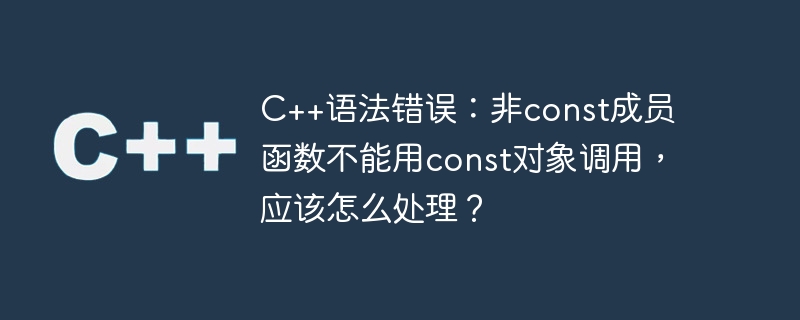

C is a very powerful programming language, but when learning and using C, we will inevitably encounter some problems. One of the problems that often troubles beginners is the error message "Non-const member functions cannot be called with const objects." In this article, we will explore how to deal with this error.
First of all, to understand this error message, we need to know some basic knowledge. There is the const keyword in C, which can be used to modify variables, pointers and function parameters, indicating that these objects cannot be modified. In C, if an object is declared const, then its member functions should also be declared const.
When we use a const object to call a non-const member function, the compiler will prompt the error "Non-const member functions cannot be called with const objects." This is because in C, const objects are read-only and cannot be modified. Non-const member functions may modify the state of the object, so they cannot be called with const objects.
So, how should we deal with this error? First, we need to determine whether this member function needs to modify the state of the object. If there is no need to modify the state of the object, then we should declare this member function as const. In this way, even if we call this member function using a const object, no error will occur.
For example, suppose we have a class:
class Person {
public:
//getter函数,在不修改对象的情况下获取成员变量的值
std::string getName() const;
// setter函数,修改对象的成员变量值
void setName(std::string name);
private:
std::string m_name;
};In this class, the getName function only obtains the value of m_name and does not modify the state of the object. Therefore, we should declare it as const:
std::string getName() const;
In addition, when defining this function, we must also add the const keyword after the function name:
std::string Person::getName() const {
return m_name;
}In this way, even if we use When the const object calls the getName function, no error will occur.
If a member function needs to modify the state of the object, then we cannot declare it as const. But if we want to call this function using a const object, we can convert this object to a non-const object. We can use type conversion to achieve this purpose. For example, suppose we have a const Person object p, and we need to use the setName function to modify the value of the m_name member variable of p. We can do this:
const Person p;
Person& pRef = const_cast<Person&>(p); // 将const对象转化为非const对象
pRef.setName("New Name"); // 调用setName函数修改成员变量的值It should be noted that this approach is not recommended. If a member function needs to modify the state of the object, then we should avoid using a const object to call this function.
In short, in C, we need to pay attention to the use of const keyword. If an object is declared const, then its member functions should also be declared const. When we encounter the error "non-const member functions cannot be called with const objects", we need to carefully check whether the member function needs to modify the state of the object. If we do not need to modify the state of the object, we should declare the member function as const . If a member function needs to modify the state of the object, we should avoid using const objects to call this function.
The above is the detailed content of C++ syntax error: non-const member functions cannot be called with const objects, what should I do?. For more information, please follow other related articles on the PHP Chinese website!
 c language const usage
c language const usage
 What are the differences between c++ and c language
What are the differences between c++ and c language
 Recommended learning order for c++ and python
Recommended learning order for c++ and python
 Cost-effectiveness analysis of learning python and c++
Cost-effectiveness analysis of learning python and c++
 Is c language the same as c++?
Is c language the same as c++?
 Which is better to learn first, c language or c++?
Which is better to learn first, c language or c++?
 The difference and connection between c language and c++
The difference and connection between c language and c++
 C++ software Chinese change tutorial
C++ software Chinese change tutorial




